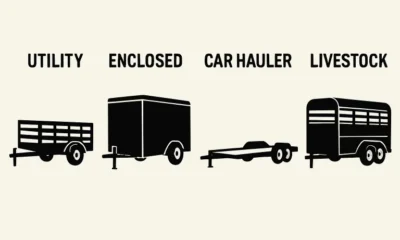General
The Role of Hydraulic Filters in Preventing Equipment Failure

Hydraulic filters are critical for extending equipment life, decreasing downtime and maintenance costs, and increasing production. They also lower environmental impact.
A hydraulic system is used in various equipment such as missiles, aircraft manufacturing machinery, automobiles, and tractors to power their steering systems and transmissions. The fluids that power these systems must be free of contaminants to prevent failure and maintain efficiency.
Reduced Downtime
Hydraulic systems have many complex components, but the hydraulic fluid is the essential link that allows them to operate. Unfortunately, fluid properties (viscosity) or contamination variations can lead to equipment problems.
Particles can settle in critical areas, creating a sludge that leads to a component seizure. They can also erode surfaces and react with other materials in close-tolerance areas, shortening their life. To avoid these problems, designers and system users rely on their experience with specific components and information from the component manufacturers to determine how clean the hydraulic medium should be.
Keeping the hydraulic fluid in your system clean reduces downtime and prevents early component failure. To do this, you must use the right filtration type and maintain a desirable cleanliness level specification for the hydraulic fluid. An excellent way to ensure a desirable cleanliness level is to follow the recommended maintenance practices for your hydraulic system, including filter replacement.
When selecting hydraulic filter suppliers VA, it’s essential to prioritize quality, reliability, and compatibility with the specific hydraulic system requirements. Choosing reputable suppliers ensures hydraulic systems operate efficiently and remain protected from harmful contaminants.
Reduced Maintenance Costs
Filters are essential to ensuring that hydraulic equipment lasts as long as possible. They strain out contaminants to prevent them from cycling through critical components and damaging them over time, reducing replacement costs.
The majority of problems with hydraulic systems are related to fluid contamination. Even a particle much smaller than the clearances in pumps and valves is capable of causing failure. The self-cleaning nature of dynamic filters ensures that contaminants are continuously removed from the hydraulic fluid, preventing clogging and allowing components to operate more reliably for longer.
The unique requirements of a hydraulic system will determine the sort of filter employed. Buyers should leverage critical data about their machine and the expertise of a reputable resource to determine what filter type is best for their needs.
Increased Productivity
Hydraulic systems use fluid power in various industries, including aerospace and aviation, construction, agriculture, military and defense, mining, and chemical processing. A clean hydraulic system provides optimum performance and helps prevent equipment failure.
Dirty hydraulic fluid can cause component failure by increasing friction and heat, creating sludge, and allowing particles to reach critical tolerance areas where they can seize components. Filters are essential for keeping the fluid clean and preventing these problems.
Most manufacturers of load-bearing equipment conduct tests and specify an optimum (or target) cleanliness level for their hydraulic components. Exposing these components to dirty fluid significantly shortens their life span. Implementing a maintenance schedule that includes regularly checking and replacing filters is necessary to extend the life of hydraulic systems and avoid these costly breakdowns. Using quality filters, following manufacturer recommendations for replacement intervals, and maintaining detailed records of filter usage are also important. Typically, in-line filters are installed on return lines; reservoir breather filters can be located inside the fluid tank; and portable off-line filtration systems such as drum toppers and filter carts can be used to maintain the fluid cleanliness of multiple hydraulic systems at once.
Reduced environmental impact
Hydraulic filters remove contaminants from hydraulic systems to protect equipment components and ensure efficient operation. The filters force hydraulic fluid through porous filter elements to catch foreign particles on a microscopic scale. This prevents those contaminants from reentering the fluid flow and damaging downstream components.
Contamination can take various forms, including solid particles, water, air, and reactive chemicals. All of these types of contamination impair the function of a hydraulic system.
The more contamination a hydraulic system takes in, the more damage it will endure, including corrosion, cavitation, wear, and sludge formation. To reduce these negative impacts, a system needs a filtration strategy that limits the intake of contaminants and quickly removes them when they appear.
General
Streamlined & Up-to-Date: Navigating the Simple Steps and Current Requirements to Become a Notary Public

Becoming a notary public provides an opportunity to serve the public, safeguard the integrity of critical documents, and establish a respected professional role. With the demand for notarization services increasing, understanding the latest statutory guidelines and best practices is vital for new applicants. If you are already certified and seeking to extend your credentials, you can complete your Florida notary renewal quickly online to stay compliant and continue your notarial duties without interruption.
The procedure to become a notary can differ widely depending on your state. Yet, most paths involve similar steps, fulfilling eligibility criteria, undergoing education, submitting documentation, and securing the correct supplies. Recent regulatory changes have added new requirements in certain areas, so it’s important to consult your state government’s website for real-time updates and official forms.
Eligibility Criteria
To become a notary public, applicants must meet certain foundational requirements that demonstrate their reliability and suitability for the role. Most states require notary applicants to:
- Be at least 18 years of age.
- Establish legal residency in the state where they intend to serve.
- Maintain a clean criminal record, free from felony convictions or serious offences.
- Demonstrate competency in reading and writing English.
Education and Training
Training has become more prevalent as notarial work grows in complexity and consequence. Many states now require all first-time applicants to complete notary education courses. Such coursework usually covers core topics, including notarial acts, record keeping, identification procedures, and ethical practices. For example, Florida necessitates a three-hour class, while California and Ohio require state-approved educational sessions for new notaries and those seeking reappointment.
States may provide online modules or classroom-based instruction. Even if your state does not mandate a training course, voluntary education can help avoid mistakes and enhance your notarial expertise.
Examination Requirements
Not all states require notary applicants to pass an exam, but those that do often enforce rigorous testing to verify applicants’ legal knowledge and procedural understanding. For example, California candidates must pass a proctored written examination with questions on both state law and ethical scenarios. Even if your state’s test is optional, reviewing sample questions or formal guides can be immensely beneficial.
Preparation materials are commonly available through state agencies or the National Notary Association. Remember, a strong grasp of rules helps you avoid mistakes and ensures legal protection for yourself and document signers.
Surety Bond and Insurance
Most states require new notaries to purchase a surety bond before they can be commissioned. This bond protects the public by providing a financial guarantee against negligent acts or fraud by the notary. Bond values differ; Florida mandates a $7,500 bond, while Texas requires $10,000. Surety bonds are arranged through licensed agents or insurance companies as part of the application process.
While not usually mandatory, Errors & Omissions (E&O) insurance is highly recommended. E&O provides personal protection if a mistake leads to legal action. This coverage is separate from the surety bond and safeguards your financial well-being as a notary.
General
312 Area Code Chicago’s Iconic Identity and Legacy

The 312 Area Code stands as one of the most iconic numeric identifiers in American telecommunications history. Rooted in the heart of Chicago, it signifies more than just a routing number for phone calls. It reflects the city’s cultural identity, economic vibrancy, and historical depth.
Introduced in 1947 as part of the original North American Numbering Plan (NANP), the 312 Area Code was initially assigned to cover the entire Chicago metropolitan region. Over the decades, urban growth, technological expansion, and population surges led to numerous splits and overlays, but 312 remained a core symbol of downtown Chicago. As a result, it became synonymous with power, prestige, and legacy.
The journey of the 312 Area Code isn’t merely about numbers. It’s about evolution, adaptation, and how one sequence of digits became etched in the urban fabric of one of America’s greatest cities.
The Origin of the 312 Area Code
In 1947, the Bell System introduced area codes to streamline long-distance dialing. At that time, 312 was designated for all of northeastern Illinois, including Chicago. This simple code was one of the 86 original area codes introduced nationwide.
Because of its central location in Illinois and its economic significance, 312 quickly became a focal point in the nation’s communication network. Initially, few could have predicted the cultural importance it would come to hold.
The Impact of Growth on the 312 Area Code
Over time, Chicago’s population expanded rapidly. As residential neighborhoods grew and suburbanization increased, demand for new phone numbers skyrocketed. By the early 1980s, pressure on the 312 Area Code became unsustainable.
To relieve this pressure, a major split occurred in 1989. The newly created 708 Area Code was assigned to the suburban regions surrounding Chicago, leaving 312 to serve only the city proper. Yet even with that adjustment, the number of new phone users continued to climb.
In 1996, another split carved out the 773 Area Code to cover areas outside of downtown, while 312 was confined to the Loop and the Near North Side. These boundaries gave 312 an even more exclusive footprint, enhancing its status as a digital badge of urban identity.
The Cultural Status of 312
Today, the 312 Area Code is more than a technical label—it’s a symbol of authenticity and city pride. Businesses proudly display 312 numbers to signal their downtown roots. Entrepreneurs, artists, and influencers use it to broadcast their connection to the city’s energetic core.
Chicago-based products and services often leverage the 312 code in branding to reinforce locality and trust. Whether it appears on beer bottles, T-shirts, or in hip-hop lyrics, 312 evokes an unmistakable link to a particular style, grit, and sophistication.
Why Some Area Codes Matter More Than Others
Not all area codes are created equal. While many function quietly in the background, codes like 212 (New York City), 213 (Los Angeles), and 312 (Chicago) command attention. This prominence often stems from their early assignment, historical resonance, and associations with major urban centers.
In Chicago, 312 holds particular significance due to its limited geographic coverage and prestigious location. Owning a 312 number conveys a sense of establishment and authenticity. It’s akin to having a vintage address in a landmark neighborhood.
Area Code Splits and Overlays Explained
To understand the evolution of 312, one must first grasp the concept of splits and overlays. A split occurs when an area code’s territory is divided, and a new code is assigned to part of the region. This happened with 312 in both 1989 and 1996.
Overlays, on the other hand, involve assigning a new code to the same geographic area as an existing code. This method preserves existing numbers while providing additional numbering capacity. In 2009, the 872 overlay was added to both 312 and 773 regions, allowing for number expansion without geographical redefinition.
Dialing in the 312 Region Today
Residents and businesses in the 312 zone must use 10-digit dialing for local calls due to the overlay with 872. This shift in dialing habits reflects broader changes in telecommunications, where mobile phones, VoIP services, and smart devices have increased the demand for unique numbers.
Though technology continues to evolve, the structure of area codes remains integral to how communications are routed and managed.
Business Presence in the 312 Area Code
Many of Chicago’s most influential companies maintain a 312 presence. From financial institutions to law firms, media outlets to tech startups, having a 312 number signals credibility and prime location. It’s not just about where you are—it’s about what that place says about your brand.
For startups and small businesses, acquiring a 312 number is often seen as a strategic move. It places them in the same league as corporate giants, even if their office space is shared or virtual.
Real Estate and 312: Location as Prestige
In real estate, the 312 Area Code is often associated with high-value properties. Offices and residences within its boundaries enjoy proximity to downtown amenities, transportation hubs, and cultural institutions.
Because 312 is limited to the central part of the city, inventory is scarce, making demand higher. Thus, the area code indirectly contributes to real estate valuation and desirability.
Pop Culture References to 312
Chicago’s area code frequently pops up in music, film, and television. Artists like Kanye West and Common have referenced it in lyrics, using 312 as shorthand for authenticity and homegrown roots.
Furthermore, local brands like Goose Island have used “312” in product naming, deepening the emotional connection between consumers and the region.
Telecommunications Technology Behind 312
Behind the scenes, the 312 Area Code is supported by a complex infrastructure. Switches, routers, and databases handle the routing of calls and data transmissions. As VoIP and 5G technologies grow, these networks must adapt while still maintaining the integrity of area code boundaries.
The integration of 312 into national systems requires ongoing management by the North American Numbering Plan Administration (NANPA), which ensures that each code is used efficiently and responsibly.
Who Regulates the 312 Area Code?
The 312 Area Code falls under the jurisdiction of the Illinois Commerce Commission (ICC) and the Federal Communications Commission (FCC). These bodies oversee numbering assignments, service provider compliance, and customer protections.
Additionally, NANPA coordinates with local telecoms to handle requests for new numbers, retirements of old lines, and implementation of new overlays when necessary.
Area Code Fatigue and How 312 Remains Relevant
With the increasing need for phone numbers, some cities suffer from area code fatigue—an overload of digits and a loss of geographic identity. However, 312 has managed to avoid dilution.
Because its coverage is strictly limited and its association with downtown Chicago remains intact, 312 has retained its cachet in an age when numbers are more disposable than ever.
The Psychology of Number Memorability
Research shows that shorter, more symmetrical numbers are easier to remember. The 312 format, with its low digits and rhythmic structure, sticks in people’s minds. It’s why companies often seek out such sequences for branding.
In the case of Chicago, the 312 code is part of the city’s cognitive map. Ask any lifelong resident to name a local number, and chances are it starts with 312.
Social Media and the Rise of 312 Hashtags
Across Instagram, Twitter, and TikTok, hashtags like #312Love and #Chicago312 are used to denote location pride. These tags serve not only as community markers but also as tools for business promotion and cultural expression.
In a world where location data influences marketing, #312 has become a brand all its own.
Challenges Facing Area Code Management
One modern challenge includes number exhaustion. With so many devices needing numbers, including watches, tablets, and IoT tools, administrators must plan carefully to avoid running out.
Additionally, fraud prevention is a growing concern. Scammers often spoof trusted area codes like 312 to trick recipients into answering calls. Regulators are now implementing stricter caller ID authentication measures to combat this issue.
The Future of 312
Looking ahead, 312 is expected to remain stable, though the digital landscape may shift. Advances in technology could one day make area codes obsolete. Nevertheless, the emotional and cultural ties to area codes like 312 suggest they will persist in some form, even if usage changes.
Why Residents Feel Protective of 312
Ask any native Chicagoan about 312, and you’ll likely hear a sense of pride. To many, it’s more than digits—it’s heritage. As such, proposals to change or reassign parts of the 312 zone often meet resistance.
This local loyalty ensures that 312 remains not only intact but revered.
Educational Institutions and the 312 Code
Major universities like DePaul and UIC have campuses within the 312 region. As a result, students and staff often use 312 in communications, further spreading its identity. Moreover, campus marketing frequently incorporates the area code as part of broader urban branding.
Tourism and the 312 Experience
For visitors, calling a 312 number to book a tour or hotel offers an implicit message—you’re engaging with the “real” Chicago. Travel guides and concierge services note this, encouraging businesses to keep their 312 numbers visible on all channels.
Community Organizations and 312
Many nonprofits and neighborhood associations within the 312 Area Code incorporate it into their identity. Doing so helps establish geographic legitimacy and creates trust within the local population.
Marketing with 312: Best Practices
Brands looking to capitalize on the 312 mystique should do so authentically. Using a 312 number without a local presence can backfire. However, for legitimate local brands, the code can become a linchpin of their visual and verbal identity.
Final Thoughts on the Legacy of 312
While many area codes serve purely functional roles, the 312 Area Code tells a story. It chronicles the rise of a city, the growth of a digital landscape, and the enduring importance of identity. For Chicagoans, it represents continuity, legacy, and home.
So the next time a 312 number flashes on your screen, know this: it’s not just a call. It’s a connection to a city that shaped America—and still shapes the future.
General
What Happens Behind the Scenes of a Huntsville Moving Service on a Busy Day

The sound of heavy-duty boots shuffling across floors, the steady rhythm of tape sealing boxes, and the occasional call between team members—this is the behind-the-scenes energy of a moving day. While it might seem like a simple process from the outside, there’s a carefully coordinated effort happening to ensure everything gets from one place to another without a hitch. Behind every smooth move in Huntsville, AL, there’s a team working hard to make it happen.
Navigating Tight Spaces and Heavy Lifting Without a Hitch
From narrow hallways to sharp stairwells, movers in Huntsville, AL, are constantly working through tight spaces without damaging walls, floors, or furniture. It’s not just about strength—it’s about precision. Professional movers understand the best angles to maneuver large items and use tools like lifting straps and dollies to handle bulky furniture with ease.
In homes with tricky layouts, movers often remove doors or disassemble furniture to avoid scratches or dents. A well-trained crew knows that technique matters just as much as muscle. By carefully tilting, pivoting, and lifting, they ensure that even the heaviest items make it through doorways without a problem. This level of care is what separates experienced moving companies in Huntsville, AL, from amateurs.
Real-Time Problem Solving When Unexpected Challenges Arise
Even with a solid plan, unexpected issues can pop up at any time. Maybe an elevator breaks down in a high-rise, or a piece of furniture doesn’t fit through the stairwell as expected. Huntsville moving services rely on quick thinking to keep everything on track. Instead of panicking, professional movers come up with immediate solutions—whether it’s finding an alternative route, disassembling an item, or adjusting the loading plan.
Weather is another unpredictable factor. Rain can turn a smooth move into a logistical challenge, requiring teams to cover furniture with plastic wrap and create safe walking paths to avoid slippery conditions. No matter the obstacle, experienced movers in Huntsville, AL, know how to adapt and keep things running smoothly.
Coordinating Multiple Moving Trucks to Keep Everything Flowing Smoothly
On busy days, some moves require more than one truck, especially for large homes or office relocations. Organizing multiple trucks isn’t just about filling them up—it’s about making sure items are loaded in the right order for easy unloading at the new location. A well-planned move prevents unnecessary delays and frustration.
Experienced moving services in Huntsville, AL, use clear labeling systems to separate items based on rooms and priority. This means fragile items aren’t buried under heavy furniture, and essentials like beds and couches are the first things off the truck. Proper coordination allows movers to unload efficiently so families can settle in faster without sorting through a chaotic pile of boxes.
Protecting Floors, Walls, and Doorways from Moving Day Mishaps
A scratched hardwood floor or a dented wall can turn a smooth move into a frustrating experience. Professional movers understand that protecting a home during a move is just as important as getting everything out safely. They use floor runners, padding, and door jamb protectors to prevent damage.
Even small details, like placing felt pads under furniture legs or carefully lifting instead of dragging, can make a big difference. Movers in Huntsville, AL, take extra precautions to ensure that when a family moves out, they leave the home in great condition—whether for the next owners or to get their security deposit back.
Handling Special Requests Like Fragile Items and Oversized Furniture
Some moves come with unique challenges, like transporting antique furniture, delicate glassware, or oddly shaped items that don’t fit in standard boxes. This is where specialized techniques and equipment come into play. Huntsville moving services use custom crating, bubble wrap, and padding to keep valuables safe during transit.
Oversized furniture also requires careful handling. Sectional sofas, large dining tables, and pianos aren’t just heavy—they require strategic maneuvering to avoid damage. Whether it means taking a door off its hinges or using furniture sliders, experienced movers make sure every item arrives intact at its destination.
Final Inspections to Make Sure Every Box Ends Up in the Right Place
After hours of lifting and loading, the job isn’t over once the last box is off the truck. The best moving companies in Huntsville, AL, go through a final walkthrough to ensure nothing is left behind and everything is placed in the correct room. This saves time and energy for the homeowner, preventing the frustration of searching for essentials like kitchenware or bedding after a long day.
Movers check closets, garages, and even behind doors to make sure nothing is forgotten. A quick inventory review ensures that all labeled boxes match their intended rooms. This level of detail helps families settle in faster, making a hectic moving day feel a little more manageable.






